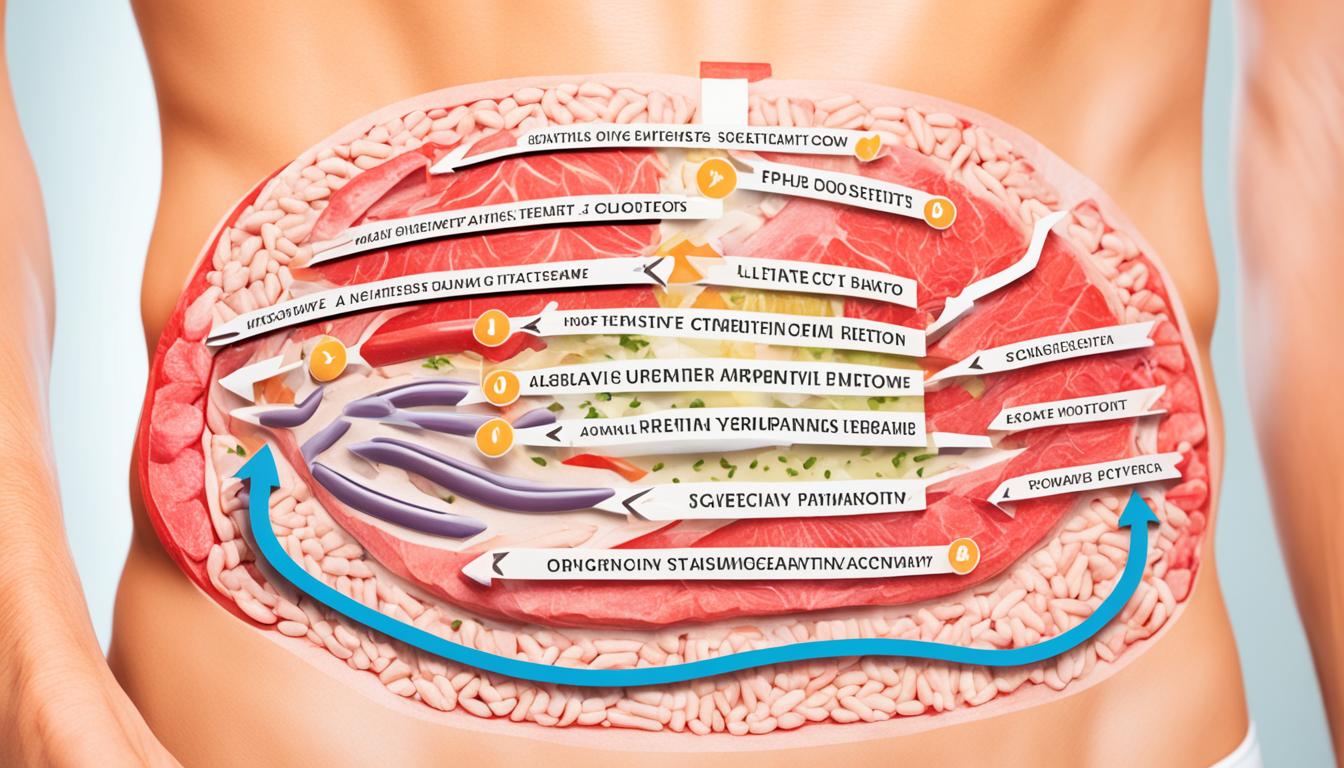Health
Benefits of Supplmenting Digestive Emzymes
In Australia and surrounding regions, millions of people suffer from digestive issues, highlighting the pressing need for effective digestive health solutions. Digestive enzymes, often overshadowed by probiotics, present a promising avenue for improving nutrient uptake, boosting energy, and enhancing general wellbeing. For individuals facing enzyme deficiencies, either due to genetic factors or lifestyle choices, incorporating these enzymes can significantly alleviate symptoms like stomach distress, bloating, and nutritional challenges. This, in turn, markedly improves their life quality.
Your body’s digestion is akin to a complex theatre production, with digestive enzymes playing crucial roles. Ensuring these essential elements are available and functional is key for optimal digestive function. Even those with a balanced diet may find that adding digestive enzymes can provide the extra support needed for robust gut health. This supplementation acts as a backstage pass, helping some achieve a more fortified digestive system.
Key Takeaways
- Digestive enzymes are essential for breakdown and nutrient absorption, affecting energy levels and growth.
- Supplementation can benefit those with enzyme deficiencies, addressing symptoms and supporting gut health.
- Improving digestion is crucial for the millions experiencing digestive discomfort, and enzymes play a key role.
- A balanced approach to nutrition and digestive health often necessitates an understanding of when to supplement enzymes.
- Symptoms like belly pain and bloating can indicate a need for supplemental enzymes for better nutrient utilization.
Understanding Digestive Enzymes and Their Functions
Welcome to an intricate exploration of the unsung heroes within us: digestive proteins. These phenomenal substances significantly enhance our health by optimizing food breakdown and nutrient utilization.
What Are Digestive Enzymes?
Visualize a metropolis, each worker executing a unique role. Similarly, digestive enzymes meticulously break down consumed food into minuscule, absorbable fragments. Situated throughout your gastrointestinal tract, they are indispensable for extracting nutrients from your diet. They transform complex substances into energy and fundamental components vital for your body.
The Role of Enzymes in Digestion
From the moment food enters your mouth, digestive enzymes are activated. They meticulously decompose food, ensuring carbohydrates, fats, and proteins are efficiently processed for nutrient utilization. This precise mechanism is essential for providing your body with necessary fuel, facilitating growth, and cellular repair.
Enzymes Produced by the Pancreas
The pancreas, a frequently underestimated organ, serves as a central hub for pancreatic enzymes production. It plays a key role in digestion. Amylase, lipase, and protease are its primary outputs, targeting carbohydrates, fats, and proteins, respectively. The absence of these enzymes would impede our body’s ability to convert food into a consumable state.
| Enzyme | Target Nutrient | Function |
|---|---|---|
| Amylase | Carbohydrates | Breaks down starches into sugars |
| Lipase | Fats | Assists in the digestion of fats into fatty acids and glycerol |
| Protease | Proteins | Helps in cleaving proteins into peptides and amino acids |
Having been introduced to these pivotal digestive agents, you’re now more attuned to the intricate processing of nourishment. This facilitates a greater appreciation for the elaborate journey your food undertakes to sustain your health.
Identifying Symptoms of Digestive Enzyme Insufficiency
A deficiency in necessary digestive enzymes manifests through various enzyme insufficiency symptoms. These symptoms signify more than mere discomfort; they point towards significant health concerns that could progress to malnutrition or serious gastrointestinal irritation. Early recognition of these signs is vital for managing digestive health adeptly. Key indicators include persistent abdominal pain, cramping, and abnormal bloating.
Moreover, ongoing diarrhea, excessive flatulence, and the observation of greasy stools should raise concern. These symptoms might suggest conditions like sucrase-isomaltase deficiency or exocrine pancreatic insufficiency. Additionally, unexplained weight loss often accompanies these signs, denoting an absorption issue concerning essential nutrients.

It is critical to be aware of these symptoms since they can progress, leading to prolonged discomfort and possible nutritional deficits. To elucidate the relationship between enzyme insufficiency and its symptoms, consider the table below. It highlights the primary symptoms associated with specific digestive deficits:
| Enzyme Insufficiency | Common Symptoms | Potential Consequences |
|---|---|---|
| Sucrase-Isomaltase Deficiency | Bloating, Diarrhea, Gas | Malnutrition, Intolerance to Certain Sugars |
| Exocrine Pancreatic Insufficiency | Weight Loss, Oily Stools, Belly Pain | Gastrointestinal Irritation, Vitamin Deficiencies |
| Lactose Intolerance | Cramps, Bloating, Diarrhea | Calcium Absorption Issues, Bone Density Reduction |
Consulting a healthcare professional becomes essential if you exhibit any enzyme insufficiency symptoms. They are equipped to offer a comprehensive diagnosis. Subsequently, they will develop a treatment strategy, possibly incorporating enzyme supplementation or dietary modifications. Such interventions are designed to mitigate potential malnutrition and lessen gastrointestinal irritation.
Distinguishing Between Probiotics and Digestive Enzymes
In the realm of digestive health, grasping the enzyme-probiotic difference is crucial. Each plays a pivotal role within digestion, yet they contribute uniquely towards the well-being of your gut.
The Unique Function of Enzymes in Digestion
As biological catalysts, enzymes accelerate the dismantling of food, enabling nutrient absorption. Their action targets proteins, carbohydrates, and fats, converting these into molecules that are more readily absorbed by your body’s gut flora.

How Probiotics Complement Enzymes
Contrastingly, probiotics are live microorganisms that enhance the gut’s microbial balance. Instead of digesting food, they work in concert with enzymes, fostering a stronger, more effective digestive system.
| Digestive Enzymes | Probiotics |
|---|---|
| Catalyse food breakdown | Bolster gut microbial balance |
| Support nutrient absorption | Assist in maintaining gut lining integrity |
| Target specific food substances | Produce beneficial compounds |
| Require supplementation in deficiency | Can be replenished through fermented foods or supplements |
The symbiosis between enzymes and probiotics plays a vital role in digestive health. Addressing the needs of both, perhaps through dietary measures or supplements, is essential. It ensures efficient digestion and maintains a balanced, healthy gut flora.
Genetics and Conditions that Affect Digestive Enzyme Levels
Digestive complications might not solely arise from dietary choices. They can originate from intrinsic genetic enzyme disorders or chronic conditions impacting the pancreas. These anomalies may provoke enzyme gene mutations or pancreatic insufficiency. This disrupts the essential equilibrium for optimal digestion.

Common Disorders Leading to Enzyme Insufficiency
Various ailments can induce pancreatic insufficiency, impairing the organ’s enzymatic production and secretion. Chronic pancreatitis, for example, perpetually harms pancreatic tissues, leading to reduced enzyme levels. Conversely, pancreatic cancer may impede the release of enzymes. Early detection of these signs can facilitate the pursuit of effective treatments, possibly including enzyme replacement therapies.
Understanding Congenital Enzyme Deficiencies
Congenital enzyme deficiencies arise from birth, frequently due to inherited genetic enzyme disorders. These hereditary mutations compromise the body’s capacity to synthesize specific essential enzymes for digestion. Consequently, this results in nutritional deficiencies from inadequate digestion and absorption. Undergoing genetic testing if you have ongoing digestive issues could reveal important insights, guiding towards an effective treatment plan.
Exploring Sources of Digestive Enzymes Beyond Our Body
In circumstances where your body requires additional digestive aid, awareness of enzyme supplements and external enzyme sources proves invaluable. Whether addressing a distinct condition or aiming to boost the digestive process, numerous alternatives to our body’s own enzymes are available to assist.

Individuals contending with chronic digestive disorders, such as cystic fibrosis or pancreatitis, often find solace in prescribed enzyme treatments. These specialized formulations provide necessary digestive aid. Termed as pancreatic enzyme replacement therapy, these interventions are crucial for managing specific ailments effectively.
For those experiencing common digestive discomforts, like gas or heartburn, over-the-counter enzyme supplements may seem beneficial. However, these OTC supplements lack FDA regulation, necessitating cautious consideration. Despite their potential for convenience and symptom relief, the absence of oversight for these products demands decisions informed by healthcare consultation.
- Prescription Enzyme Supplements:
- Pancreatic Enzyme Replacement Therapy
- Critical for Chronic Conditions
- Medically Prescribed
- OTC Enzyme Supplements:
- Suitable for Common Digestive Issues
- Not FDA-Regulated
- Varying Concentrations and Potencies
Augmenting your body with enzyme supplements emerges as a strategic approach when endogenous production falls short. A comprehensive understanding of external enzyme sources arms you with the discernment to select the most fitting digestive support. This empowers you to navigate your health care adeptly, utilizing top-tier resources.
The Efficacy of Prescription Digestive Enzymes
Prescription digestive enzymes, especially pancreatic enzyme replacement therapy (PERT), provide significant relief for individuals with conditions such as cystic fibrosis. PERT’s role extends beyond mere supplementation. It fundamentally improves the body’s ability to digest and absorb essential nutrients.
PERT formulations simulate the enzymes that the pancreas naturally secretes. This restoration corrects the dysfunction caused by the pancreas’s compromised activity. For patients experiencing enzyme inadequacy, PERT’s effect on digestion and nutrient absorption can be transformative. It facilitates enhanced weight management and holistic wellbeing.
The advantages of pancreatic enzyme replacement therapy extend past nutrient absorption enhancement. Ongoing research delves into its potential for treating conditions like irritable bowel syndrome. Although conclusive results on these secondary benefits are pending, the possibility of PERT providing broader relief is captivating medical researchers.
Appropriate dosing and continuous patient observation are crucial when administering PERT. Clinicians personalize the treatment to meet each patient’s unique requirements. This customization might involve adjustments to find the most efficacious dose. Such an individualized strategy ensures patients gain maximal benefits from their enzyme insufficiency treatment, elevating their quality of life.
When exploring enzyme replacement therapies, partnership with knowledgeable healthcare practitioners is paramount. Opting for PERT is more than choosing a supplement. It is a critical lifeline for individuals grappling with the ramifications of enzyme insufficiency.
Over-the-Counter Digestive Enzymes: Are They Helpful?
Wandering through a pharmacy, one might observe shelves filled with OTC enzyme supplements, each boasting relief from digestive woes. Before succumbing to eye-catching packaging, it’s imperative to grasp what you’re contemplating. These supplements, readily accessible, pose the query: are they the solution to gut health conundrums?

What to Know About Non-prescribed Enzyme Supplements
OTC enzyme supplements feature a concoction of enzymes like amylase, lipase, and protease. These are essential for decomposing foodstuff within our bodies. Yet, supplement regulation in Australia diverges from that of prescribed medications. This means such products may not be subjected to stringent pharmaceutical testing. The uncertain efficacy and safety of these supplements raise concerns. Moreover, potential interactions with other medications highlight the necessity of consulting a healthcare professional.
Navigating the Market of Digestive Aids
In the quest for an OTC remedy to digestive discomfort, being an informed consumer is crucial. Starting with label scrutiny is wise, yet the essence lies in comprehending the implications thereof. Acknowledging the significance of, or absence of, stringent regulation is crucial. The lax controls allow some products to make unfounded, bold claims.
The subsequent table delineates a comparison among prevalent enzymes in OTC supplements. It elucidates their purpose and the advisable steps before employing their use:
| Enzyme | Function | Consumer Action |
|---|---|---|
| Amylase | Breaks down carbohydrates | Consult healthcare provider for personalised advice |
| Lipase | Aids in fat digestion | Review any existing conditions that may be affected |
| Protease | Facilitates protein breakdown | Examine potential interactions with other medications |
The appeal of these supplements is undeniable, particularly for those battling discomfort. Yet, the wisest path involves a comprehensive evaluation of the evidence, in conjunction with professional medical advice. This approach ensures the chosen method is both safe and potentially effective.
Comparing Food-derived and Supplemental Digestive Enzymes
Contemplating the link between diet and digestion invites consideration of enzymes from foods and supplements. Nutrient support is essential for optimal digestive function. The question then becomes: does a whole food diet suffice, or are supplements necessary for digestive health?
Can You Get Digestive Enzymes from Your Diet?
Certain foods are renowned for their enzyme content. Pineapples and papayas contain bromelain and papain, respectively. These proteolytic enzymes break down proteins. Still, the sufficiency of these natural enzymes in enhancing digestion warrants further investigation.

The value of a whole food diet is in its nutrient diversity, providing various nutrients, including digestive aids. Yet, even diets rich in enzymes from avocados or sauerkraut may not fulfill the body’s enzymatic needs alone.
The Limitations of Dietary Enzymes
Dietary sources of enzymes have intrinsic limitations. Cooking and processing diminish enzymes in raw foods, making them less effective. Furthermore, for individuals with particular health issues, dietary enzymes may be inadequate for their digestive needs.
| Enzyme-rich Food | Primary Enzyme | Notable Benefits |
|---|---|---|
| Pineapple | Bromelain | May help with protein digestion |
| Papaya | Papain | Assists in breaking down tough protein fibers |
| Avocado | Lipase | Aids in fat digestion |
| Sauerkraut | Lactic acid bacteria | Promotes a healthy gut environment |
In comparing natural sources to supplements, incorporating enzyme-rich foods is advantageous. Yet, for some, supplements are essential to fulfill their nutrient support needs. Supplements offer precise enzyme dosages that withstand stomach acid, ensuring delivery to the gut.
In summary, whether choosing digestive enzymes from foods or supplements, each serves unique roles in nutrient support. Identifying the appropriate balance for individual needs is vital for digestive health.
How Supplementing Digestive Enzymes May Improve Your Digestion
Exploring the utility of digestive aids for gut health can unveil significant revelations, especially when contending with digestive maladies. By focusing on elevating macronutrient absorption, digestive support supplements present a viable method to enhance digestive wellbeing. Engaging in the usage of these enzymes could substantially improve your digestion and pancreatic function.
The Breakdown of Macronutrients
Our health crucially depends on macronutrients – carbohydrates, fats, and proteins. Their effective breakdown is essential for absorption by our bodies. Supplemental digestive enzymes act as accelerants, expediting the biochemical reactions necessary for nutrient breakdown. This facilitation is pivotal, as it releases the energy within macronutrients, ensuring peak bodily function.

The body may not always synthesize sufficient enzymes, due to either an age-related decrease or specific health issues. Digestive support supplements thus step in, supplying vital enzymes to augment the body’s inherent production. This assistance ensures that macronutrient absorption remains at an optimum.
Supporting Pancreatic Health with Enzymes
The pancreas, a cornerstone of the digestive system, creates essential enzymes for digestion. Overburdening of the pancreas, whether through illness or other factors, might impair its enzyme production, hindering digestion. Thus, digestive support supplements aim to relieve the pancreas, fostering its operational capacity and possibly averting further complications.
These supplements blend with the body’s organic mechanisms, collaborating with your pancreatic function. They aid in food digestion and alleviate symptoms such as bloating, discomfort, and malabsorption, common with pancreatic inadequacies.
It’s paramount to understand that supplements are designed to aid, not substitute, natural enzyme production. The supplements and the body should function in synergy, ensuring digestive wellness. Consulting with a healthcare provider before commencing any supplement routine is essential for integrating it effectively into your digestive health regimen.
Relief from Common Digestive Complaints Through Enzymes
Enzyme therapy may offer considerable digestive alleviation for those struggling with bloating, stomach discomfort, or excessive gas. These supplements, functioning as catalysts, expedite chemical reactions within the digestive process. This acceleration aids in breaking down foods frequently linked to discomfort.
Introducing enzyme therapy into your health regimen could lead to significant improvements in gut health. We delve into how these enzymes mitigate symptoms and foster enhanced digestion. The focus rests on the enzyme types predominantly utilised for relief:
| Enzyme | Function | Commonly Used For |
|---|---|---|
| Amylase | Breaks down carbohydrates | Bloating after high-carb meals |
| Lipase | Breaks down fats | Indigestion from fatty foods |
| Protease | Breaks down proteins | Discomfort after protein-rich foods |
| Lactase | Breaks down lactose | Lactose intolerance-related symptoms |
Individuals pondering enzyme supplementation must seek advice from healthcare professionals to ensure compatibility with personal health conditions. While not universally applicable, these supplements may significantly enhance gut health for many, potentially increasing comfort.
Scientific Research on Digestive Enzymes
In the realm of enzyme research, experts are deeply exploring the roles of proteins called digestive enzymes. This exploration seeks to uncover how these enzymes influence our health. Their benefits range from aiding recovery from intensive medical treatments to reducing inflammation and alleviating muscle discomfort. Studies also highlight their role in addressing gastrointestinal issues.
The journey in enzyme research presents a mix of promising insights and necessary caution. Early findings suggest potential health benefits and underscore the need for further investigation. The current evidence reveals a spectrum of effectiveness. It’s anticipated that future investigations will define the benefits more clearly and establish usage guidelines.
Here is a comparative glance at well-documented enzyme benefits:
| Enzyme | Studied Benefit | Potential Application |
|---|---|---|
| Lipase | Improves fat digestion | Management of pancreatic insufficiency |
| Protease | Reduces inflammation | Treatment of muscle soreness |
| Amylase | Enhances carbohydrate breakdown | Support for carbohydrate digestion in enzyme deficiencies |
Note: The above information is accumulated from current scientific literature, yet individual outcomes may vary, and consultation with a healthcare professional is always advised.
If the burgeoning field of enzyme research interests you, particularly in leveraging enzyme benefits, staying updated on digestive health studies is crucial.
“Understanding enzyme supplementation can be a turning point in managing digestive health, but it’s important to remain informed and vigilant as the scientific community uncovers more pieces of this complex puzzle.”
To enhance your digestive health and overall wellbeing, staying informed about recent scientific advancements is vital.
Assessing the Safety Profile of Digestive Enzyme Supplements
When contemplating digestive enzyme supplements, prioritizing enzyme supplement safety is essential. While these supplements are generally considered safe and beneficial for digestive discomforts, recognizing potential adverse effects and allergy risks is crucial. Minor gastrointestinal disturbances are frequently reported side effects. Nonetheless, we must not overlook the rare but serious reactions that may occur.
Enzymes from sources such as papaya or pineapple could provoke allergic responses in susceptible individuals. Hence, it’s critical to identify the origin of these enzymes, especially for those with known allergies. Furthermore, vegans must meticulously examine product labels to ensure the enzyme sources align with their dietary preferences.
| Consideration | Safety and Risks |
|---|---|
| Common Side Effects | Mild gastrointestinal upset |
| Severe Side Effects | Rare but possible allergic reactions |
| Allergy Risks | Ingredients like papaya or pineapple can be allergens |
| Vegan Suitability | Verify the source of enzymes is plant-based |
Your health is of utmost importance. Thus, seeking advice from a healthcare professional before beginning any supplement is advisable. They are equipped to guide you through the complexities of enzyme supplements. This includes addressing concerns related to enzyme supplement safety, adverse effects, and allergy risks, ensuring they are suited to your specific health needs.
Interactions of Digestive Enzymes with Medications
As you delve into the intricacies of managing your health, recognizing the potential for enzyme-medication interaction becomes imperative. Digestive enzymes contribute significantly to gut health. However, their impact on the performance of medications is substantial and warrants attention.
Understanding Potential Risks with Medication
Certain enzyme supplements have the capability to modify how various medicines function within the body. For instance, individuals taking blood thinners might be unaware that specific enzyme supplements could elevate bleeding risks. Similarly, the effectiveness of antibiotics could be altered. Enzymes might adjust the rate at which these medications are assimilated into the bloodstream. This can reduce their efficacy or heighten adverse effects.
Consulting Healthcare Providers for Safe Usage
To avoid potential complications, consulting a healthcare provider before incorporating digestive enzymes into your regimen is essential. They can provide informed recommendations on integrating enzyme supplements with existing medications safely.
| Medication Type | Potential Interaction with Enzymes | Recommended Action |
|---|---|---|
| Blood Thinners | Increased risk of bleeding | Monitor therapy closely; adjust dosage as necessary |
| Antibiotics | Altered absorption rates | Stagger enzyme intake and antibiotic dosing |
| Diabetes Medications | Changes in blood sugar levels | Regular blood sugar monitoring |
By taking a proactive approach to your health and valuing professional medical advice, you can ensure your use of supplements is both beneficial and secure.
The Future of Digestive Enzymes in Healthcare
The quest to enhance enzyme therapy illuminates a path of hope for the medical field, especially concerning digestive health issues. As investigations deepen, we envision a future where these insights enable more tailored, effective enzyme solutions. This evolution could transform how chronic digestive diseases are managed, markedly improving life quality for sufferers.
Contemplate a scenario where leaps in digestive supplement technology redefine our existing boundaries. We’re looking beyond minor enhancements to monumental shifts in comprehension and application of enzymes aiding digestion and absorption. With a focus on patient-centered care, the medical sector is gearing up to integrate these breakthroughs, aspiring to provide relief and return a semblance of normality to individuals’ lives.
The strides in enzyme therapy are anchored in solid science and driven by urgent need, transcending mere theoretical discourse to nearing tangible reality. Ongoing research is unlocking new understandings, offering tangible hope to those affected by enzyme deficiencies. There exists a steadfast dedication towards enhancing enzyme therapy, ensuring its significant role in future healthcare treatments is promising.
FAQ
What benefits do digestive enzymes offer for improving digestion and nutrient absorption?
How do digestive enzymes function within the body?
Can you describe the specific enzymes produced by the pancreas and their roles?
What symptoms might indicate a digestive enzyme insufficiency?
How do probiotics differ from digestive enzymes, and can they work together?
What are some common conditions that can lead to enzyme insufficiency?
Are there external sources of digestive enzymes besides those produced in our body?
How effective are prescription digestive enzymes in treating enzyme insufficiencies?
What should you consider before using over-the-counter digestive enzyme supplements?
Can digestive enzymes be obtained through diet alone?
How do supplemental digestive enzymes support macronutrient breakdown and pancreatic health?
Do digestive enzyme supplements provide relief for common digestive complaints?
What does the current scientific research suggest about the broader health benefits of digestive enzymes?
Are digestive enzyme supplements safe, and what about allergy risks?
How do digestive enzymes interact with medications such as blood thinners and antibiotics?
What advancements might we see in the use of digestive enzymes in future healthcare?
Source Links
- https://www.health.com/condition/digestive-health/digestive-enzymes
- https://www.verywellhealth.com/the-benefits-of-digestive-enzymes-89446
- https://www.hopkinsmedicine.org/health/wellness-and-prevention/digestive-enzymes-and-digestive-enzyme-supplements

